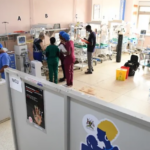In a major push against the opioid epidemic, Washington State gets $627,124 in federal aid. The U.S. Department of Labor announced the funding. It aims to tackle health and economic challenges caused by widespread opioid addiction.
This new grant, part of the National Health Emergency Dislocated Worker Grant program, adds to the $800,000 awarded in September 2023, bringing the total funding to $1,427,124.
Tackling the Opioid Epidemic with Jobs and Training
Communities in southwest Washington have suffered due to the opioid crisis. Families face economic instability and health challenges. The grant brings relief to Clark and Cowlitz counties.
The funding creates disaster relief jobs to address urgent community needs. It also offers job placement and educational services to help people rebuild their lives.
These services target those who lost jobs and face homelessness.
Workers will receive training in addiction treatment, mental health, and pain management. It will equip them with skills to support their communities and open new career opportunities.
“We are committed to assisting workers impacted by the opioid crisis,” said José Javier Rodríguez, Assistant Secretary for Employment and Training.
He highlighted the importance of addressing both health and economic issues together.
Clark and Cowlitz counties will benefit the most from this initiative. Many residents in these areas struggle with long-term unemployment, and homelessness often worsens their hardships.
Coordinated Efforts for Long-Term Solutions
This grant is part of a larger federal strategy. In 2017, the U.S. Department of Health and Human Services declared the opioid crisis a public health emergency, unlocking funding under the Workforce Innovation and Opportunity Act (WIOA).
WIOA expands the capacity of local dislocated worker programs. It helps states respond to large-scale economic disruptions.
These grants provide immediate support for affected workers.
The disaster relief positions funded by this grant are essential. They focus on public health efforts and community recovery. This work lays the foundation for long-term stability.
Transitioning workers into meaningful roles is a priority. The training programs prepare them for careers in high-demand fields.
These include addiction treatment and mental health support.

Washington’s approach shows how targeted funding can make a difference. The program sets a strong example by focusing on immediate relief and future opportunities.
The funding also strengthens local economies. It addresses job losses caused by the epidemic. Workers gain new skills, and communities recover faster.
This initiative could inspire similar programs in other states. The project’s impact will be closely monitored as it progresses. Success here could guide efforts in different regions facing similar challenges.
Washington’s response underscores the power of coordinated action. Federal and state agencies working together can tackle even the most challenging crises.
This funding represents a step toward recovery and hope for Clark and Cowlitz counties.
- 107shares
- Facebook Messenger
About the author
Paul Dement is a seasoned journalist specializing in breaking news, national and international stories, reviews, and opinion pieces. With over a decade of experience, he is committed to delivering accurate, up-to-date coverage that helps people stay informed and engaged. Paul earned his Journalism degree from the University of Oklahoma and remains dedicated to covering the stories that truly matter to the global community.





